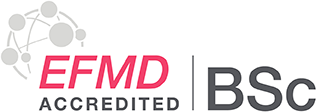Sustainable – Knowledge that thinks of tomorrow
Sustainability is anchored as a central goal in the identity of the university and the business school. The examination of sustainable development as a topic in teaching and research is manifested in a variety of ways. Students are prepared to deal with questions of ethics and corporate responsibility for an economically, socially, and ecologically sustainable globalization. Teachers and researchers are free to decide whether and, if so, how they want to participate in these efforts through the freedom of science, teaching and research protected by the German constitution.
The Business School's involvement with sustainability already dates to the second half of the 1980s, when lectures in the Faculty of Business and Law first addressed environmental economics. In the 1990s, the subject area of business and corporate ethics was added. With the establishment of the elective subject "Ethics and Focus on Social Responsibility" (EGV) in 2007, the permanent anchoring in the curriculum finally followed. EGV is taken by all students in the 6th semester of the bachelor's programs in business administration. It aims to broaden the economic value perspective to include ethical and social issues and their consequences for corporate social responsibility, which is becoming increasingly important in the context of globalization. Courses are offered in German and English, so EGV is also open to international exchange students.
The Baden-Württemberg Ethikum Certificate
The Ethikum certificates were awarded for the first time at Business School Pforzheim in 2004/05. The Ethikum is a state-wide certificate awarded by the Baden-Württemberg Department for Technology and Science Ethics in cooperation with the ethics officers of Baden-Württemberg's universities. The Ethikum can be awarded to students of universities of applied sciences who have dealt particularly intensively with questions of ethics, sustainability and/or the social and intercultural side of professional action.
Principles for Responsible Management (PRME)
Pforzheim University has committed itself to adhering to sustainable principles. It was one of the first 100 educational institutions worldwide to join the UN initiative „Principles for Responsible Management Education” (PRME), which pursues a responsible management education.
For the Business School, participation in PRME is the logical continuation of its activities in the sense of responsibility and sustainability-oriented education. In addition to subject-specific qualifications, companies increasingly expect graduates to have competencies in corporate responsibility. The topics of corporate responsibility and sustainability are integrated into teaching and research, with a particular focus on the practical requirements.
Specialized Bachelor’s and Master’s programs
Teaching on sustainability topics is also reflected in two programs designed by the Institute for Industrial Ecology (INEC): The Bachelor’s program Resource Efficiency Management and the master’s program Life Cycle & Sustainability.
In the sustainability management Bachelor's degree program Nachhaltigkeit und Ressourceneffizienz (BNRE) , students learn, in addition to a classical business administration education, how the efficient use of energetic and material resources in production is possible and what potential this opens up for the natural environment and, at the same time, the company's value creation.
The Master's program Life Cycle & Sustainability (MLiCS), which is part of the environmental sciences, focuses on the acquisition and practical application of methodological competence in sustainable development, life cycle assessment and in the field of production and product-related material and energy flow analyses. In addition, the interfaces of these methods to production and process engineering, environmental and sustainability management, energy systems and lean production are considered.
Institute for Industrial Ecology
A flagship of the university for the field of research is the Institute for Industrial Ecology, which runs the doctoral program "Energy Systems and Resource Efficiency (ENRES)" together with the Stuttgart University of Applied Sciences and the Karlsruhe Institute of Technology (KIT). Numerous projects in the field of quantitative sustainability assessment and resource efficiency are carried out at INEC, e.g. for the Federal Ministry of Education and Research and for the state of Baden-Württemberg. In addition, there are corporations with large companies as well as with small and medium-sized enterprises, where many consulting projects have been successfully completed so far. In addition, there is close cooperation with research groups from other institutions in Germany and abroad.
Research and its transfer into teaching and practice
At Pforzheim University, research around challenges of an economically, socially, and ecologically sustainable development takes place in several projects, research institutes and study programs. The Center for Consumer Research and Sustainable Consumption (VUNK), founded in 2018, deals with issues such as sustainable consumption and obsolescence.
Transfer into teaching and practice takes place via publications, but also via conferences and public lecture events such as the series "Resource Efficiency and Sustainability". Topics dealing with economically, socially, or ecologically sustainable development are also included in the Studium Generale.
Moreover, the Institute for Human Resource Research (IfP) has a focus on sustainability and agility in companies as well as co-determination and industrial relations. In projects on sustainable human resource management (nHRM), the institute deals with the role of HRM through sustainability in companies.
Student initiatives on sustainability
At Business School Pforzheim, three initiatives are particularly committed to sustainability & PRME:
initiAID helps people by turning their ideas into real projects. Students from initiAID have founded a computer lab in a South African township, where they work with local partners to teach computer skills important for success in the job market. In Pforzheim, the initiative works with university employees to help refugees.
sneep The Student Network for Ethics in Economics and Practice drives student discourse on economic and business ethics issues as well as sustainable business in theory and practice. Through projects in a wide variety of fields, the initiative aims to raise awareness and interest in business and corporate ethics among students and the Business School.
UNICEF In the spirit of the Charter of the United Nations, the UNICEF University Group contributes to the maintenance of peace, the solution of humanitarian problems and the development of respect for law and justice among all peoples. Through its work, it aims to make students aware and sensitive to the grievances and needs of people around the world.


